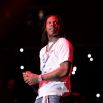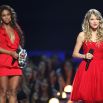Experimental singer-songwriter Misty Boyce got her start backing artists such as Ingrid Michaelson, The Naked Brothers Band and most recently, Sara Bareilles, on stage but now it's Boyce's turn to be front and center. A formally trained and highly versatile artist in her own right, Boyce followed up her debut album with her second full-length, The Life. The album is out today on Bandcamp. Ahead of its release, we caught up with Boyce to talk about inspirations behind the album, her favorite memories on tour with Sara Bareilles, adjusting to life in L.A. after moving from New York, and more. Here's what she had to say:
MT: So you're a formally trained musician, and I read that you kind of had to unlearn what you had learned in school. What is your favorite musical theory rule to break when you write?
MB: Well I guess I learned in jazz school that 1-4-5 is boring. Going to the 1 chord, then the 4 chord, then the 5 chord, like a country song. Like the most simple, basic chord progression is a no-no because it's boring and I had to unlearn that because it's actually where all of the magic is.
MT: Yeah that's the bread and butter of pop music.
MB: I mean there's some pop songs that are 1 chord, some Madonna songs that never change and yet it's still super interesting the whole time, and that's a skill in and of itself.
MT: What's the idea behind that way of thinking in jazz?
MB: I guess the whole, well not the whole thinking behind jazz, but basically since Charlie Parker, he was the one that was like I'm going to take all these popular songs and add shifty chord changes to it and then play through it. So modern jazz comes a little from that mentality. You start there. You start by making it super complex, and I think even the best jazz musicians start to try to strip that complexity away at some point. It's like being a painter. The best painters learn how to paint in exasperating detail and then Picasso is like no, now I'm just going to be weird.
MT: So does jazz music still influence your sound or is that just kind of where you got your skill set and then moved on from that?
MB: I think that's where I got a skill set and then the skill set that I learned playing jazz, I don't use at all in writing songs anymore. I did when I first started. I would put in all these complex instrumental breaks and then thought that's silly, I just want to write a song.
MT: Does your songwriting process start with the lyrics or music first?
MB: I think definitely I'm a music-first person and then melody or the chords, or both come first and then I add lyrics later, or sometimes the magical thing happens where I'm just kind of singing random stuff and lyrics come out in the moment and that's really awesome, but that's rare. Only like a couple of songs have I had the lyrics for first and even then it's maybe like one line or something like that.
MT: Being from New Mexico and performing a lot in Los Angeles and New York, how have those music meccas influenced your sound? Do you feel like you connect more with the L.A. sound now that you live there?
MB: It's interesting in that music has become very homogenized in a way, but I do think there's still a bit of a difference between the New York sound and the L.A. sound, which I think is really great. When I made the decision to move here a couple years ago, I was gravitating toward artists coming out of here, like Dawes and like Blake Mills. I'm mostly interested in people playing the sh*t out of their instruments and writing really good songs. I'm not super into how everyone can make a record on their computer. That really bums me out as a musician. It shouldn't, but it does. It's all music, so that's great. I love finding those people who are still really taking being great at their instrument seriously and putting on a really good live show and making their words mean everything. Not to say that that's not happening in New York, but the style that I was looking for seemed to be happening more in LA.
MT: I know many musicians tour with other acts to pay the bills and see some cool places, but really, their heart is in their own projects. What does working with other acts mean to you?
MB: It kind of started out as another way to pay the bills, but I've played with a couple of musicians whose projects I felt like I cared about it as much as my own. I think Sara [Bareilles] was one of those. It doesn't happen very often. It is sort of like a day job in a way, but every now and then I get lucky and get to play with somebody that I also really care about and care about their music.
MT: So what were some highlights of that tour with Sara Bareilles? Was there anything that stuck out in particular to you?
MB: Yes, actually. Radio City was definitely one of the big ones. Just playing there and looking out to the sea of people and I've seen so many great shows there and that was a very big moment. But even bigger than that was when we played in Sara's hometown, close to Eureka, California, up near San Francisco. We played in a really small theater and she wanted to do "The Way You Look Tonight," and I played a jazz solo. I hadn't played jazz in forever, and then I was doing it on a stage with her, and I actually did really well. And I don't know, it was a magical moment. I felt like all the things that I had worked on had led me to this moment, and it was a really cool experience.
MT: Is there a song of Sara's that's your favorite to play or cover?
MB: I love playing "Eden" from her new record, [The Blessed Unrest], and "Satellite Call." Those songs I look forward to every night.
MT: What was your songwriting process like for the album? Were you writing on the road a lot or did you carve out some time just to focus on this project?
MB: I would say half and half. Some of my songs are older that I just had and hadn't recorded yet, and then the five or six are newer ones I wrote when I was home in L.A. in between tour cycles with Sara. During some points, I had two months at home and that's where most of those songs came from. I do write on the road, but I haven't ever written anything that's actually stuck.
MT: Was there anything particularly inspiring you at the time? Any themes or events in your life?
MB: Yeah, I had gone through a pretty big break-up. There was a wedding planned and I bailed. I moved to L.A. and I was feeling kind of like a gypsy and a little bit lost and a little bit sad, not a little bit, pretty sad. I was just feeling like I how one person says paper bags are better than plastic bags then I hear that actually paper bags take as much energy to make as plastic bags, so it's all going to sh*t anyway. So these broader, hopelessness feelings in life, I was feeling in my own small little universe, too. It's a lot about that kind of thing, but also trying to reach for happiness in whatever way I could. I don't want to stay in that space. I don't want to stay in that sadness. I want to practice looking outside of my own world and not to the shitty parts of it.
MT: Have you been able to spend much time in L.A. there since you actually moved?
MB: No I haven't.
MT: So it probably doesn't feel like home yet.
MB: Not really, I mean it was a year and a half of being here, but not here. My stuff was here, but I was never here. But I guess I've been here for 3 months now since the tour is over and I'm just now starting to feel like all right, cool, I got my place, and now I'm meeting more people and that's great and now I'd like to work a little bit more and just do stuff.
MT: So you just need to get out and get to know the area still?
MB: Yeah, totally. New York I knew where to go on any given night to see something great or hang out with friends, and I don't really have that here yet.
MT: You'll get there. How do you like it compared to New York?
MB: I feel, I love it here. It's just as expensive as New York, but what you get for your money is more and the pace is a little bit slower, which I really needed and that actually gives me room to be more creative. I felt like I was just burning at both ends all the time, working constantly and, granted I would like to be busier here, I would like to be working more, I'd like for it to be a little bit faster of a pace, but I feel like there's room to still be a person here.
MT: What are you envisioning for your live shows in support of the record?
MB: I feel like the simpler, the better. The record has a lot of layers on it, like all modern records do. There's a lot of keyboard parts, and there's a lot of guitar parts and tons of layered vocals. There's 108 tracks on every song. But when I go to see a live show what impacts me most is the simplicity of vocal words. I want to be able to understand the words and hear the vocals so there needs to be enough space to hear that. So I try, in a live show, to keep it simple enough that I can express what I want to express, but not so simple that it falls flat. It's getting that good balance of enough to keep it interesting, but not too much that it steals the show.
MT: I saw that you're touring in Germany. I was wondering, did you just find an unexpected fan base there?
MB: There's an interesting pipeline that happened between Germany and Brooklyn. Through this booking agent named Olaf Beise, he found an artist named Steve Waitt and more and more Brooklyn artists started coming over to Germany through him. He has connections in the northwest part of Germany, and there are smallish clubs that pay a guarantee to Americans, which was like the dream. I just want to tour and break even, and that's like a godsend. And you can go through him. I've been able to go tour Germany and play to really, kind, welcoming, responsive audiences. One time I walked away making 75 bucks, which is unheard of, but mostly I break even. It's just, I have grown a fan base through doing it, but being an American, Germans will just come to the show because you're from L.A. or New York, so you kind of don't have to have a name there like you do in the states.
MT: That's interesting.
MB: It was really, so magical. I felt like a rock star over there.
MT: What's next with this album? Are you going to be pushing that a while or will you start making new music?
MB: I guess both. I'm still looking to get on a tour with another artist, to open for them because I don't really have enough of a fan base across the states to justify going on tour by myself again. I did that in the spring, and it was really fun, but I had to play a lot of sh*tty clubs in between to make it work, so I'm looking for the smart next step to support the record while I'm writing a lot and waiting to see where my next step should be.
MT: Do you have a backing band or is it just you on stage for these shows?
MB: I have a band when I'm in L.A. or New York, but when I'm touring, sometimes I'm allowed to bring my boyfriend and maybe another person with me, but usually it's just by myself.
MT: Do you play keys or guitar, or both?
MB: I've been doing mostly guitar these days, but if there's a piano there I'll definitely play the piano. It's easier to travel with a guitar, and a lot of these new songs were written on guitar.
MT: Going back to the record. You raised money for the album on Pledge Music. I always find it interesting to think of who buys these exclusives. Did you ever end up going to coffee, record shopping, sending a birthday phone call, playing on someone's record or performing at their house? If so, what was that experience like with your fans?
MB: I did, but the fans that bought those were people that I already knew. So it was sort of just getting together with people I was already friends with.
MT: I saw that a percentage of your post-goal money was going to National Eating Disorders Association. Why is that cause close to you?
MB: I had an eating disorder and it was one of the most important life-changing things in my life to go to therapy and overcome it. I think, one of the things that's shaped me the most, and working with Pledge requires that you give to a charity, which I think is so great, and the one that felt the most honest and closest to my own life was that.
For more information on Misty Boyce, head over to her official website or follow her on Twitter, Facebook, Instagram, and YouTube. If you're near Chicago, you can also check her out live at Uncommon Ground on Thursday night (Jan. 22) or the night before (Jan. 21) in Evanston at Levere Memorial Temple.
© 2026 MusicTimes.com All rights reserved. Do not reproduce without permission.




